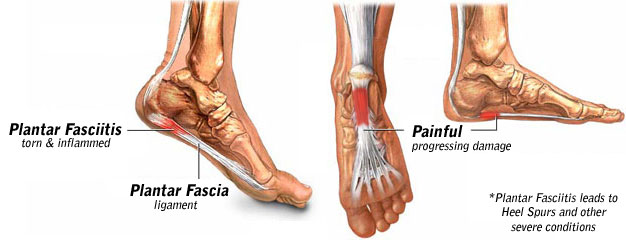
Plantar Fasciitis
Plantar fasciitis is a painful inflammatory process of the plantar fascia of the bottom of the foot. Longstanding cases of plantar fasciitis often demonstrate more degenerative changes than inflammatory changes, in which case they are termed plantar fasciosis. The plantar fascia is a thick fibrous band of tissue that originates at the heel and goes to all 5 toes. It is extremely common and effecting over two million Americans a year.
It is commonly associated with long periods of weight bearing, long distance running, and/or being overweight. The pain is usually felt on the underside of the heel and is often most intense with the first steps of the day. Another symptom is that the sufferer has difficulty bending the foot so that the toes are brought toward the shin (decreased dorsiflexion of the ankle). Frequently, knee pain and hip pain is seen along cases of plantar fasciitis. Dysfunction of the sacrum and pelvis can cause gait disturbances that lead to plantar fasciitis.
Plantar fasciitis tends to respond well to techniques such as tool assisted myofascial release, often known as Graston®. Splints are useful in the control of the progression of plantar fasciitis but ineffective in the reversal of the condition.
Key Features
- Sharp pain in/around heel
- Difficulty fulling flexing foot
- Worst after inactivity
- Common in Runners
